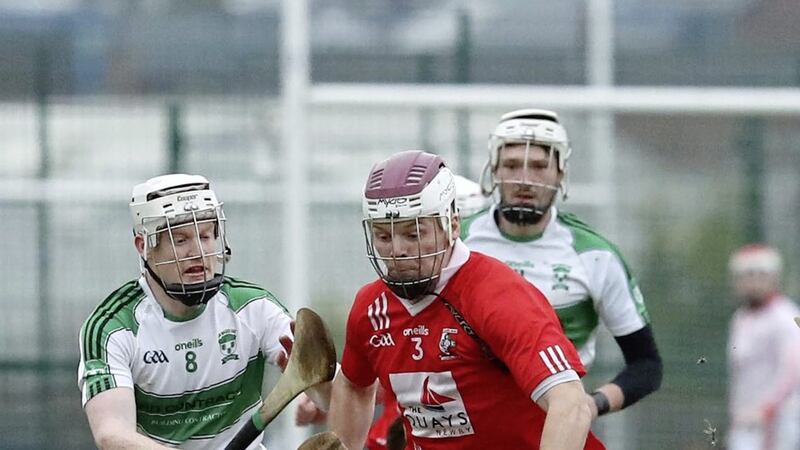OFFICIALLY the crowd at the 1953 All-Ireland final between Armagh and Kerry was 85,155, but the actual figure is estimated at being closer to 100,000.
Even the official attendance was a record for Croke Park and it was regarded as the largest gathering ever to have witnessed a sporting event in this country.
Armagh were the first team from north of the border to reach the decider and their battle with Kerry (who had won 16 titles by then) was the first-ever final to be broadcast globally on short wave radio.
Clan na Gael clubman Brian Seeley scored the final, defiant point for Armagh that day 71 years ago and the sad passing of the Lurgan native on Sunday closed the final chapter on a genuine GAA legend whose contribution to his club and county was “almost beyond compare” according to Jimmy Smyth.
“I was walking around in the parade thinking I wasn’t going to play...” Armagh Sam Maguire winner Blaine Hughes came perilously close to missing All-Ireland final
“It’s no way to promote the game in Armagh...” Hurling championship semi-final in doubt as Craobh Rua object to fixture congestion and burn-out issues
Smyth, the captain of Armagh’s 1977 All-Ireland final team, accompanied All-Ireland winners Stefan Campbell and Shane McPartlan when they brought the Sam Maguire on a visit to their revered clubmate at his nursing home.
Seventy-five years previously, in 1949, a 16-year-old Brian played on the ‘Clans’ team that defeated St John’s in Corrigan Park by a point to win the first (at that time unofficial) Ulster Club Championship title.

He’d won the first of four county senior championships the same year with victory over Crossmaglen Rangers. The following year he added a second and the same season he captained the Clans to their first minor title – a feat equalled by great-grandson James Austin recently.
“Captaincy came easy to Brian,” Smyth, who played alongside and for Seeley, added.
In 1951, playing at full-back, he led Armagh to an Ulster Minor Championship and to an All-Ireland final against Roscommon. However, confusion reigned after Cavan lodged an objection against Fermanagh (who had beaten them in an earlier round) claiming they had fielded an overage player.
The objection was upheld meaning Armagh had to beat Cavan in a replayed Ulster final before eventually meeting Roscommon in early December in a delayed decider at Croke Park.
Armagh lost but Brian’s disappointment was short-lived when, two years later, Armagh beat Cavan in the Ulster final and Roscommon in the All-Ireland semi-final to reached the county’s first ever senior decider.
With 20-year-old Brian wearing the number 11 jersey, Armagh led at half-time and at one stage it seemed a famous victory might be theirs but they fell just short against a Kerry side that Brian conceded was “the better team on the day”. One of his abiding memories was hearing the giant iron gates of Croke Park being forced open by the huge crowd of Armagh supporters as he made his way to the changing rooms.

Brian won Ulster minor, junior, senior and McKenna Cup titles with Armagh but when his county career came to a premature end his attention turned to his club. After losing two senior finals in the mid-1950s, the Clans’ fortunes began to decline and the Lurgan side dropped to intermediate level in the early sixties.
They won the intermediate championship in 1965 and with the emergence of a group of talented minors including Colum McKinstry, Danny Treanor, Martin Kavanagh, Kevin France, Jimmy Smyth and the O’Hagan brothers, Noel, Jim and Sean, the club began to rise again.
The Clans won three minor titles in-a-row and backboned by the experience of Seeley, John Green, Oliver Crewe, Aidan Patterson and Padge Scullion they won the McKillop Cup (Armagh championship) in 1968 and ‘69.
Brian took over as manager the following year with an emphasis on fitness, basic skills and short passing and led his club to eight county finals, winning five, and five Ulster Club finals, winning three in-a-row (1972-74).
His biggest disappointment was in losing a replayed All-Ireland Club final to UCD in 1974, having beaten UCC in the semi-final. The uneven playing field was summed up by captain John Green, who pointed out: “UCD had the pick of Ireland, while the most of our team came from five streets in Shankill estate”.

Brian retired from management in 1979 and spent his following years watching his beloved Clans as an interested spectator.
“He was never slow to give advice, especially when his grandson, Michael Austin, took over the senior team in 2016 for a few seasons,” added Jimmy Smyth.
“He delighted in their wins over the following years, especially at underage level. After Armagh collected the Sam Maguire for the first time in 2002, in 2004 he watched with delight as his other grandson, Ronan Austin, helped drive the Orchard county to an Ulster and All-Ireland U21 title
“On Sunday, he smiled after hearing that the Clans had beaten the Cross in the Championship in Davitt Park and his broadest smile was on hearing that his great-grandson, James Austin, had played a major part in the victory, scoring a point in the process.
“Brian is predeceased by his wife Bernadette, his son Marcel and survived by his daughters, Geralyn and Laura.”
Go ndeannaigh Dia trocaire ar anam dilis.
Armagh All-Ireland final 1953 v Kerry
Eamon McMahon; Gene Morgan, Jack Bratten, John McKnight; Frank Kernan, Pat O’Neill, Sean Quinn; Mick O’Hanlon (1-1), Mal McEvoy; Joe Cunningham, Brian Seeley (0-1), Bill McCorry; Paddy Campbell, Art O’Hagan, Gerry O’Neill (0-3)
Subs: Gerry Wilson, Gerry Murphy, Joe O’Hare





